Monitoring and assessing sustainable intensification – Accra meeting sets out ways forward
 Sustainable intensification (SI) is at the core of Africa RISING’s research agenda.
Sustainable intensification (SI) is at the core of Africa RISING’s research agenda.
It needs to demonstrate that sustainable intensification (SI) is a feasible way forward to achieve Africa’s food security and poverty reduction.
However, this quest is imbued with complications, as the very notion of sustainable intensification remains draped with mystery. Questions frequently arise as to ‘what it is’, whether it’s a ‘pipe dream or the only option‘ and crucially ‘how to monitor and assess complex construct such as sustainable intensification‘.
This last question was on the agenda at the recent Stakeholder workshop in sustainable agricultural intensification in Africa (Accra, Ghana, 10-13 July 2013) where 50 participants came from the Forum for Agricultural Research in Africa (FARA), Africa’s sub-regional and non-governmental organizations, national agricultural research systems, universities and farmer organizations; CGIAR centres and research programs and major African sustainable intensification programs, financing organizations and investors.
What emerged from these discussions? Africa RISING colleagues in the meeting mentioned two main points – and pondered the role of Africa RISING in this respect:
The challenges of assessing sustainable intensification
In seems there are no widely agreed upon indicators for the various ‘dimensions’ of SI or ‘thresholds’ or ‘benchmarks’ for those indicators, which would serve to determine sustainable intensification, even though practices such as integrated pest management and conservation agriculture seem to be generally accepted under that broad construct.
One participant argued that “sustainable intensification” is perhaps best viewed as a process, not as a single endpoint.
Most actors working on SI tend to focus on a qualitative understanding of it rather than a unified set of metrics that allow comparison across SI initiatives… leading back to basic questions such as ‘what exactly is sustainable intensification’?
Most of them also tend to focus on specific practices (e.g. agroforestry, conservation agriculture) rather than on outcomes that SI ought to achieve.
Aside from SI strictly, the complexity of farming systems is usually not well captured by traditional M&E systems for agricultural research and development: while field level yield enhancements are usually well covered by them, other collective and more complex aspects such as long term natural resource management and human well being are not understood well enough, let alone assessed.
Out of pragmatism. development programs focus on productivity (intensification) rather than on sustainability.
Ways to assess sustainable intensification?
The experts gathered in Accra suggested that a quantitative, outcome-oriented Sustainable Intensification Index be developed. This would support the definition, quantification, comparison, and evaluation of SI interventions/systems across multiple contexts.
Each Index component would be supported by key indicators that represent the best possible proxy measure for the desired SI outcome (e.g. total factor productivity/yield for productivity, diet diversity/health/etc. for human well-being). Ideally, that system would allow capturing different baseline conditions between various systems and geographic contexts and articulation of different goals and tradeoffs that reflect local, national or other priorities, i.e income over nutrition, or environment over productivity.
Combined with a set of sustainability thresholds providing context/system-specific levels that set the minimum criteria for sustainability, this Index would be a rather comprehensive approach to assessing sustainable intensification.
As an added benefit, the Index would also facilitate data sharing across people working on sustainable intensification.
A role for Africa RISING?
The group of participants that gathered in Accra represented in effect a budding community of practice on sustainable intensification. Africa RISING, with its various experiences in understanding farming systems, particularly in Malawi under the leadership of Michigan State University and in the Ethiopian Highlands under the combined efforts of CGIAR centres, is well positioned to engage with this community of practice and convene more regular events of the kind organised in Accra.
An initial task could be to help further crowdsource the identification of the indicators that workshop participants started elaborating in Accra. The Monitoring and Evaluation team of Africa RISING could support such efforts to apply the lessons of that collective effort directly in the Africa RISING monitoring framework which has been underway for some time.
Sustainable intensification may not be clear to all, but demystifying its components has clearly become an intensive exercise rewuiring sustained efforts!




